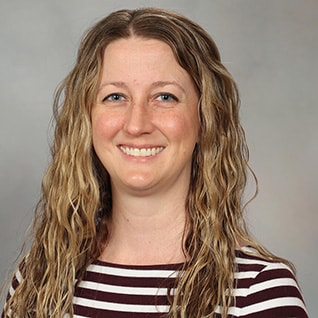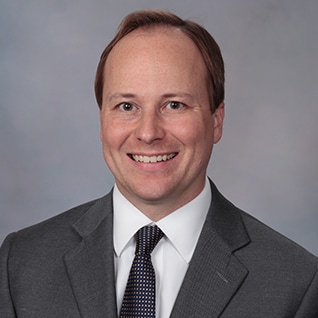Department and Faculty
/prod01/channel_2/media/mccms/content-assets/academics/residencies-and-fellowships/pulmonary-medicine-fellowship-minnesota/department-and-faculty/Pul-Med-Flshp-MN-1024X512-WF3077100-0002.jpg)
Experts in the Division of Pulmonary and Critical Care Medicine at Mayo Clinic provide comprehensive consultative, diagnostic, and therapeutic services for patients with illnesses that affect the lungs and breathing.
Physicians provide care for a broad range of common and rare respiratory conditions, including:
- Lung cancer diagnosis and treatment
- Chronic obstructive lung diseases, including asthma
- Interstitial lung diseases
- Pulmonary vascular disease, including pulmonary hypertension
- Sleep disorders
- Acute and chronic respiratory failure
- Various lung infections
The latest technology is used to provide state-of-the-art care in outpatient and hospital settings, including the intensive care units.
From the program director
 Welcome! We are delighted about your interest in our Pulmonary Medicine fellowship program at Mayo Clinic in Rochester, MN. Our program is unique and offers trainees ample exposure to the wide breadth of pulmonary disorders, from the common to the complex. Those who visit our department quickly notice the dedication of our faculty and the engaging spirit of our fellows. The Division of Pulmonary and Critical Care Medicine is one of the top programs in the nation for respiratory disorders in U.S. News & World Report.
Welcome! We are delighted about your interest in our Pulmonary Medicine fellowship program at Mayo Clinic in Rochester, MN. Our program is unique and offers trainees ample exposure to the wide breadth of pulmonary disorders, from the common to the complex. Those who visit our department quickly notice the dedication of our faculty and the engaging spirit of our fellows. The Division of Pulmonary and Critical Care Medicine is one of the top programs in the nation for respiratory disorders in U.S. News & World Report.
Mayo Clinic emphasizes three shields: clinical practice, education, and research. Our fellows are engaged in excellent teaching and supervision by world-renowned experts. During the two-year training program fellows are supported to pursue scholarship with research opportunities that range from basic science to clinical practice, quality improvement, ethics, global health, and education.
We encourage innovation and welcome fellows to individualize their training pathway to meet their professional goals. Our division is extremely proud of our fellows and all they have accomplished during their time with us. We look forward to the opportunity to meet you and show you firsthand how we can help you succeed.
Cassandra Braun, M.D.
Pulmonary Medicine Fellowship Director
From the associate program director
 Thank you for your interest in our pulmonary fellowship program! You will be exposed to incredible breadth and depth of pulmonary medicine at Mayo Clinic. We see a mix of both community patients with common lung diseases such as asthma and COPD, and we also provide care for a nationwide and international referral practice of patients with rare or complex lung diseases. As a fellow, you will be the primary pulmonologist caring for both types of patients with the close support and guidance of faculty who may be world expert in their field. This is a unique and amazing place to learn pulmonary medicine!
Thank you for your interest in our pulmonary fellowship program! You will be exposed to incredible breadth and depth of pulmonary medicine at Mayo Clinic. We see a mix of both community patients with common lung diseases such as asthma and COPD, and we also provide care for a nationwide and international referral practice of patients with rare or complex lung diseases. As a fellow, you will be the primary pulmonologist caring for both types of patients with the close support and guidance of faculty who may be world expert in their field. This is a unique and amazing place to learn pulmonary medicine!
Our fellowship training will not just develop strong clinical skills but also provide you with guidance and mentoring for a successful career as academic pulmonologist. There are a breadth of research opportunities for trainees, and fellows are encouraged to tailor their research experiences to their specific academic interest. We are proud of the graduates from our pulmonary fellowship who are emerging leaders in pulmonary medicine and have secured faculty positions here at Mayo Clinic and elsewhere. On behalf of Dr. Braun and myself and the entire faculty, thank you for your interest in our program and we hope you will consider applying!
Joseph Skalski, M.D.
Pulmonary Medicine Fellowship Associate Program Director
/prod01/channel_2/media/mccms/content-assets/academics/residencies-and-fellowships/infectious-diseases-fellowship-arizona/department-and-faculty/mccms-pulmonary-medicine-fellowship-mn-1024X512-WF6559659_0020.jpg)
Faculty
In addition to caring for patients in their clinical practices, Mayo Clinic's faculty members are committed to teaching and facilitating the growth of medical knowledge. Many of our faculty members have published and lectured extensively and are highly regarded in their fields.
You have direct access to the pulmonary and critical care faculty at Mayo Clinic throughout the Pulmonary Medicine Fellowship.
Visiting professors
Many prominent professors visit Mayo Clinic each year. They present their work during lectures and participate in hospital rounds. You are encouraged to take full advantage of these opportunities.